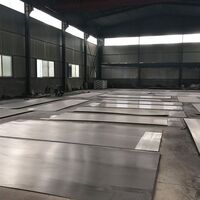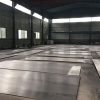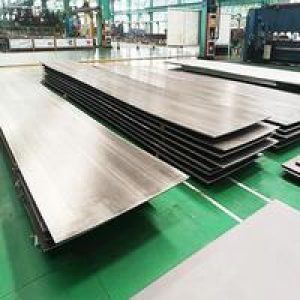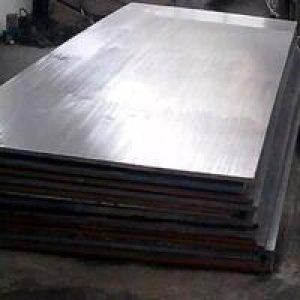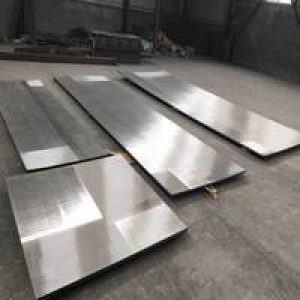Overview of Titanium alloy plate
Titanium steel composite plates are engineered by bonding layers of titanium and steel through various processes such as explosion bonding, roll bonding, or cladding. The aim is to harness the benefits of both metals: the lightweight, high strength, and corrosion resistance of titanium with the affordability and structural integrity of steel.
Features of Titanium Steel Composite Plate
- Corrosion Resistance: The titanium layer offers excellent protection against corrosion, particularly in chloride-rich environments like seawater.
- Strength & Lightweight: Titanium is known for its high strength-to-weight ratio, enhancing component performance without adding excessive weight.
- Thermal Stability: The composite can withstand high temperatures and exhibit good thermal conductivity.
- Wear Resistance: The steel layer contributes to the plate’s hardness and wear resistance, extending service life in abrasive conditions.
- Bond Strength: Advanced bonding techniques ensure a strong interfacial bond between the titanium and steel layers, maintaining structural integrity.
- Formability & Machinability: Despite being a composite material, it can be formed, welded, and machined using appropriate techniques.
Applications of Titanium alloy plate
These composite plates find use in a wide range of industries including:
- Petrochemical & Chemical Processing: For equipment resistant to corrosive chemicals.
- Marine & Offshore: In shipbuilding and offshore platforms due to their resistance to seawater corrosion.
- Power Generation: Turbines, heat exchangers, and other high-temperature, high-pressure applications.
- Aerospace: Parts requiring a balance of strength and weight reduction.
- Automotive & Racing: High-performance components subject to stress and corrosion.
- Medical Devices: Implants and surgical instruments benefiting from biocompatibility and strength.
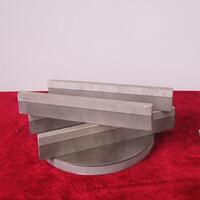
(Titanium alloy plate)
Parameters of Titanium alloy plate
Titanium alloy plate is a type of structural material made from titanium and other elements. The properties of titanium alloy plate can vary depending on the specific composition and processing techniques used in its production. However, some common parameters that affect the performance and durability of titanium alloy plate include:
* Material grade: This refers to the quality of the titanium alloy plate, which includes factors such as its chemical composition, microstructure, and mechanical properties.
* Temperament: The temperature at which the titanium alloy plate is processed can have a significant impact on its performance and durability. High-temperature processing can result in improved strength and resistance to corrosion, while low-temperature processing may lead to decreased toughness and increased susceptibility to cracking.
* Finish: The surface finish of the titanium alloy plate can also affect its performance and durability. A polished or brushed finish can enhance the appearance of the plate and improve its compatibility with other materials, but it may not provide as much corrosion protection as a machined finish.
* Manufacturing process: The manufacturing process used to produce titanium alloy plate can also impact its performance and durability. Properly formulated alloy composition and processing techniques can result in more durable and long-lasting plates. Additionally, surface preparation techniques such as plasma cutting or sanding can be used to enhance the surface finish of the plate, which can improve its compatibility with other materials.
Overall, the performance and durability of titanium alloy plate depend on a range of factors, including material grade, temperament, finish, and manufacturing process. By carefully selecting and using appropriate parameters, it is possible to produce high-quality titanium alloy plates that meet a wide range of engineering and commercial requirements.
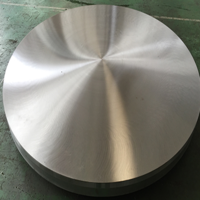
(Titanium alloy plate)
Company Profile
Metal Plates 4u is a trusted global metal material supplier & manufacturer with over 12-year-experience in providing super high-quality metal clad and relatives products.
The company has a professional technical department and Quality Supervision Department, a well-equipped laboratory, and equipped with advanced testing equipment and after-sales customer service center.
If you are looking for high-quality metal alloy clad and relative products, please feel free to contact us or click on the needed products to send an inquiry.
Payment Methods
L/C, T/T, Western Union, Paypal, Credit Card etc.
Shipment
It could be shipped by sea, by air, or by reveal ASAP as soon as repayment receipt.
FAQs of Titanium alloy plate
Q: What is the difference between Titanium alloy plate and pure titanium or steel?
A: Titanium alloy plate combines the advantages of both metals: titanium’s light weight, corrosion resistance, and biocompatibility with steel’s strength, affordability, and machinability.
Q: How is the bonding between titanium and steel achieved?
A: Bonding methods include explosion bonding, which uses controlled explosions to fuse the metals, roll bonding where the metals are pressed together under high pressure, and cladding, a process involving heat and pressure or welding to adhere the layers.
Q: Is Titanium alloy plate suitable for high-temperature applications?
A: Yes, it can withstand high temperatures, making them suitable for applications like heat exchangers and certain aerospace parts. However, the maximum operating temperature depends on the specific grades of titanium and steel used.
Q: How does the cost of Titanium alloy plate to pure titanium products?
A: While Titanium alloy plate is generally more expensive than pure steel products, they are less costly than pure titanium items, offering a cost-effective solution that leverages titanium’s benefits without its full expense.
Q: Can Titanium alloy plate be recycled?
A: Yes, both titanium and steel are recyclable materials. However, the recycling process might be more complex due to the composite nature of the material and would require specialized facilities.
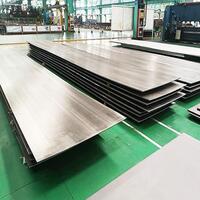
(Titanium alloy plate)

